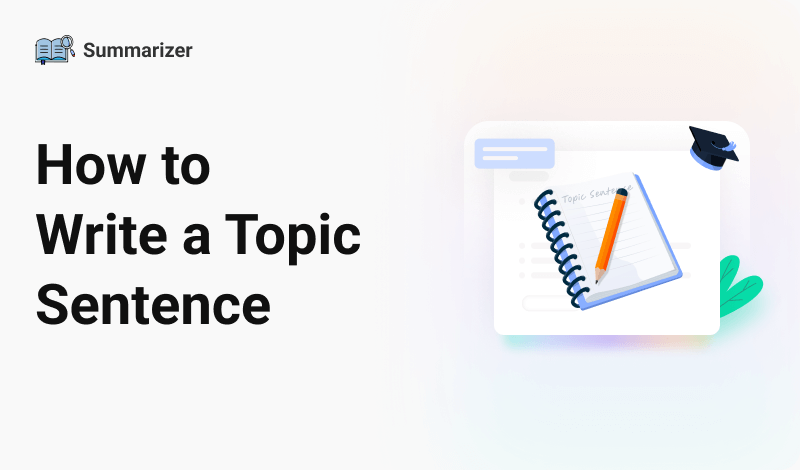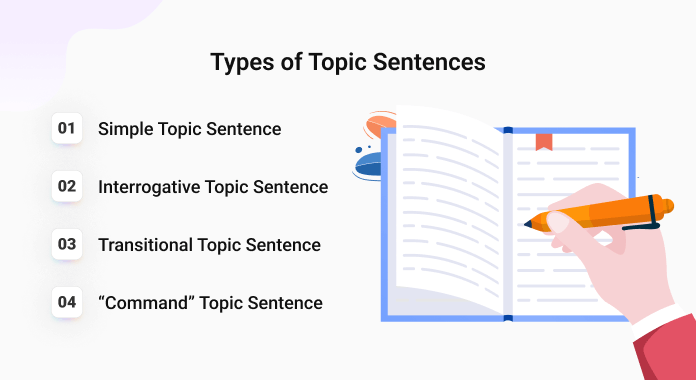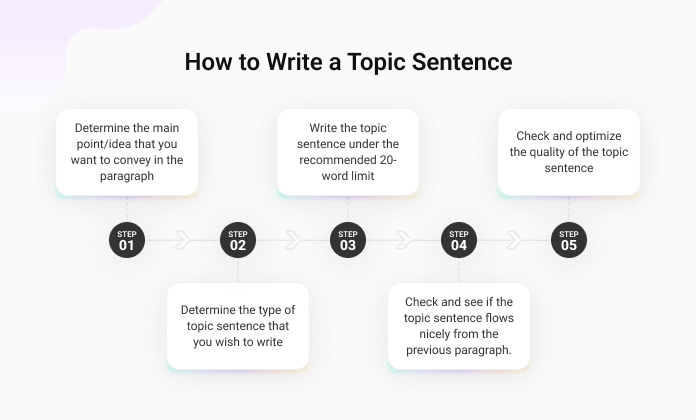Types of Topic Sentences with Examples
How to Write a Topic Sentence (Steps + Examples)

Topic sentences are an important part of academic writing. The quality and clarity of these sentences can drastically change the quality of the entire content, be it a research paper, a thesis, or an essay.
In this post, we’re going to look at what topic sentences are and how they’re written. We will guide you through the step-by-step process of writing a topic sentence while illustrating it with examples.
Let’s get started.
A topic sentence can be defined as the first sentence at the beginning of a paragraph. The purpose of the topic sentence is to describe the general idea and theme of the paragraph so that the reader realizes what it is going to be about.
It is important to create a solid topic sentence for each of the paragraphs in your write-up. This can help ensure a smooth flow of the content, and allow the reader to follow along easily.
There are different types of topic sentences. They differ depending on the way they are written and the tone they follow.
In the next heading, we’re going to look at some types of topic sentences along with their respective examples. Then we will move on to how you can write them yourself.

A simple topic sentence involves a simple statement or a line that addresses the point that you’re going to be discussing in the paragraph. There is no special tone for the sentence nor is it exclamatory or interrogative in any way.
For example, a simple topic sentence can be:
Smoking can be very harmful to the human body—a fact that has been proven by numerous studies and research.
Another example of a simple topic sentence is as follows:
The ISS travels at the speed of 7.66 Km/s, which means it makes 16 orbits of the Earth in 24 hours.
A detailed guide on Simple Sentnece
An interrogative topic sentence involves a question rather than a simple statement. In other words, you can put a question at the start of the paragraph that highlights the point that you’re going to make. This sort of topic sentence can engage the attention of the reader.
For example, an interrogative topic sentence can look like this:
Do you know how harmful smoking can be for the human body?
Here is another example:
Do you know just how fast and fascinating the motion of the International Space Station is?
Transition topic sentences are defined as topic sentences that serve to transition or change the topic of the discussion when a new paragraph is being started. Or, if the topic in the entire write-up is the same, a transitional topic sentence can be used when a different perspective is mentioned.
For example, a transitional topic sentence can look like:
While there are many advantages to owning an electrical car, there are some downsides as well.
Here is a transitional topic sentence on a different topic:
While climate change is a widely accepted phenomenon in many countries, there are many individuals who reject its reality and existence.
A command topic sentence is the type of topic sentence in which the reader is instructed and invoked to do a certain act. For example, the reader can be invoked to think of something or read something written below.
Here is what a command topic sentence can look like:
Take a look at the stats in the table below.
Another form that a command topic sentence can take is given below:
Read the heading provided above for the definition of climate change before commencing with this section.
(Detailed Article by Touro University on Topic Sentence.)
(Types of sentences with Definitions and Examples By Summarizer.org)
Moving on, let’s take a look at the steps that you can follow to write a topic sentence. Where applicable, we will also provide you with examples of the steps so that you know what exactly you’re supposed to do.

Here are the steps that you need to follow:
The first thing you need to do is think of the main idea that you’re looking to convey in the paragraph.
The content you write, such as an essay or a research paper, has a main, central topic. That topic is further divided into parts and sections, which allows it to be properly explored. In each of the paragraphs that you write, you have to address a different point of the topic. (More than one paragraph can, of course, also be used for a specific point.)
For example, if someone is writing an essay on the working of cars, one of the paragraphs would be about the chassis, one would be about the engine, the exhaust, the aerodynamics, and so on.
To write the topic sentence of a paragraph, you must first determine the exact point and the exact subject that you want to discuss in it. That way, you will be able to make the topic sentence comprehensive and truly reflective of the paragraph.
As mentioned above, there are quite a few different types of topic sentences, such as interrogative, transitional, etc. It is important to choose the right type of topic sentence for your write-up because it can decide the tone of the latter.
To choose which type of topic sentence is best for your content, you should ask yourself the following questions.
After you determine the topic that you want to address and the type of sentence that you want to write, the next step is to actually write it.
When you write the topic sentence, make sure that it is logically formed and is consistent with the tone of the overall content. Most importantly, ensure that it falls within the recommended word limit of 20 words. If a sentence is longer than that, it becomes hard to read.
For example, if you are writing a simple topic sentence for a paragraph in an essay on the working of cars, you can write it as follows: (For the sake of the example, let’s assume that the paragraph is on the working of the engine.)
The engine is one of the most complicated parts of the car, consisting of the pistons, cooling system, crankshaft, etc.
This topic sentence is a simple sentence that 1) tells the reader that the engine is going to the topic of discussion and 2) covers it in 20 words to ensure readability.
Topic sentences signal the start of a new paragraph and/or a shift in the point/sub-topic being discussed. However, this has to be done in a smooth and seamless manner.
Start reading from the previous paragraph and then move on to the topic sentence that you have written for the next to see how well it flows. Sometimes, adding a transitional phrase, such as “Moving from what we discussed earlier,” etc., can help in making the flow smoother.
The last step in the process is to check and optimize the quality of the topic sentence. There are different things to keep in mind here, including;
The length of the sentence (which we have mentioned in a previous point) is also an aspect of readability but here, we’re referring to the wording and phrasing in particular. The words and phrasing in your topic sentence, like the other sentences in the content, should be simple and clear.
As for spelling and grammar correction, you can find and fix the errors with some simple proofreading.
(Detailed guide by Indeed to write topic sentences with examples)
Before we give this one the wrap, we want to give you some tips that you can follow to make sure your topic sentences are written excellently.
The way you write topic sentences can heavily influence the overall quality of your content. If your topic sentences are well-written, your content can be more readable and understandable. The different points in your write-up can be easily distinguished.
There are different types of topic sentences, such as interrogative topic sentences, simple, transitional, and command. In the post above, we have described each of these types as well as the steps that you need to follow to properly write them.
We hope you enjoyed reading the post and that you learned a thing or two for the next time you need to create topic sentences for your content.